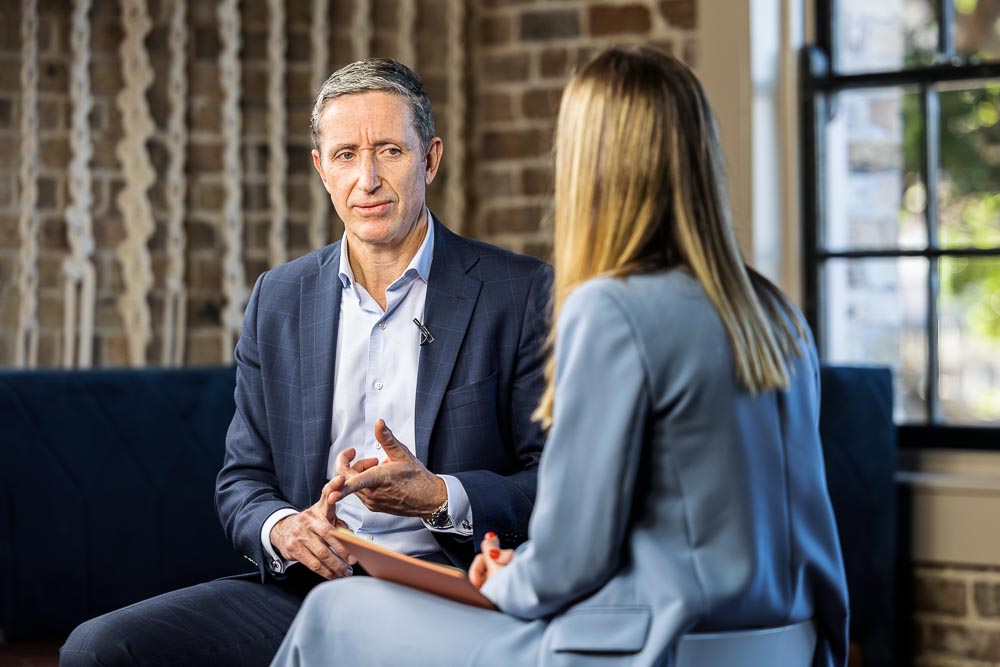David Wright's formula for future returns: Alternatives, ESG and key person risk
Having co-founded one of Australia's premier investment research and funds rating houses, Zenith Investment Partners' David Wright is truly one of the industry's most respected heavyweights.
He is kind, collected and calm. Attributes he has likely gained from nearly two decades at the helm of Zenith, as well as more than two years serving as a director and head of the investment committee at Hearts and Minds Investments (ASX:HM1), and a career in funds management research.
And while Wright recognises that some parts of the market are looking extended - here's looking at you, cryptocurrencies - there are still plenty of reasons for investors to feel optimistic, despite inflation emerging in the economy.
He's banking on alternatives - the likes of market neutral, global macro, managed futures, and multi-strategy funds - to play a more crucial role in Australian investors portfolios over the coming years; funds that are able to deliver returns irrespective of market movements.
But the greatest surprise, and learning, from my interview with Wright, was his revelation of the importance of key person risk - something that is drilled into investors as a danger throughout their careers.
You actually want key person risk. Why? Because that suggests that you've got extraordinary people managing the money for you. And if they leave, you leave.
In this interview, Wright shares countless insights that he has learnt throughout his career, and shares what he believes will be key to portfolio returns in the future.
Edited transcript
Ally Selby: First up, I'd like to talk about the investment topic or theme that you and the team are spending the most time discussing right now.
David Wright: Probably the biggest one, and it's not terribly unique, is the emergence of inflation and whether that gets out of control further than what the central banks expect. If that’s the case, it holds very wide-reaching implications.
Anecdotally at least, there's definitely wage inflation in financial services. I guess you understand that because the markets have been so strong. We've got a couple of guys in the office building houses, you can't get tradespeople. We're employing at the moment, not just in analyst roles but in admin, in IT development. The labour market is very, very tight. So it's kind of hard to see that inflation's not emerging in the economy.
And I know that the Reserve Bank and also the Federal Reserve have spoken about expecting a blip of inflation and then being able to control it. We're not so sure, expecting that if it does overshoot, you have potentially larger moves in bond yields. That's not good for equities and would create a pretty challenging investment environment if inflation surprises on the upside.
Ally Selby: How does this affect the way you construct portfolios?
David Wright: There's a number of implications for portfolios. The first thing is in the defensive component of portfolios. Since the GFC, the duration of the fixed interest benchmarks has grown longer because both governments and corporates have been taking advantage of the low-interest rate environment and issued longer-dated bonds. That's benefited a lot on the way down, but it poses a real risk of capital losses on the way back up.
In response to this, certainly within the defensive component of portfolios, we want to keep the duration of fixed interest managers and combinations short.
On the equity side, as we've already seen quite a rotation out of growth style managers into value … you want to make sure that you've got the mix of managers right in both Aussie equities and the global equity sleeves of your portfolio.
Ally Selby: So, it's about being really diversified?
David Wright: What we find in times of market stress is that people gravitate back to what they know. And so generally, portfolios become less diversified. And yet in an environment where most public markets are expensive, you need to be going wider and broader to generate sources of return – but we've found that a lot of portfolios have become less diversified.
For example, many people have lost patience with alternatives. Going forward, we believe that should hold investor appeal in helping to generate returns and protect portfolios – particularly if equity markets move either sideways, or worse still, downwards.
Ally Selby: You’ve said that markets are looking quite expensive. Where do you think we actually are in the market cycle?
David Wright: If you say that the fully extended market cycle is euphoria, I don't think we're there yet.
Ally Selby: Even with what we're seeing in cryptocurrencies right now?
David Wright: I think cryptocurrency is a market that is heavily influenced by retail investors and part of the reason for that is it's developing - it's not yet deep. It's not yet a massive market like fixed-interest government bonds, the major equity markets or even currency markets. So, it is prone to big swings on the back of things like news flow or social media announcements, as we've seen with Elon Musk's stunt more recently.
There's definitely been more retail participation in markets through the COVID crisis, for a variety of reasons. But I think there is still concern from professional investors about the economic rebound, the potential for higher inflation and the sustainability of the economic rebound, which is why I don't think we're quite at the euphoria stage of the market, though it’s certainly optimistic. And that has played out in terms of very strong consumer sentiment and business sentiment, certainly here and in the US, though not necessarily in all parts of Europe.

Ally Selby: Can you share two investment themes or ideas that you think will be really important to investors' portfolio returns over the next five years?
David Wright: Outside of what we've just spoken about in terms of watching inflation very closely, I’d also emphasise the whole (environmental, social and governance) ESG space. Again, that's not terribly unique, it's been around for a number of years. But in our experience, in the last six or 12 months, that momentum has shifted enormously. There is much more focus from investors, advisers and fund managers on ESG assessments and practices.
We've already seen examples of company share prices being bid up in response to good environmental practices. But on the opposite extreme, we’ve seen various corporates punished by the market for doing things that aren’t socially acceptable. I do think that will play out pretty strongly over the next five years and will have big implications for how money's both managed and invested.
Ally Selby: Are there any funds that you believe play really well into that theme?
David Wright: We have seen dedicated ESG funds in Australian equities, but they tend to be found more in international equities. And there’s literally only a handful of green or ESG bond or fixed interest funds, and then really not much at all in REITs and alternatives.
So, when clients ask us to construct ESG portfolios, at the moment our answer is, "We'll do our best," but you actually can't cover every asset class because there isn't always dedicated funds. So going forward, it's going to be expected but it's not just about specialist ESG managers.
Here in the Australian market, Pendal (formerly BT Financial Group) has probably been at the forefront of that, having a dedicated ESG business. Impax is another manager, who sits within the Fidante suite of asset managers. You've also got PIMCO, the world’s largest global bond manager, with a global ESG bond fund but also it's been quite a specialist field. We’ve seen some of the smaller managers evolve and be really successful in acquiring funds and interest from investors.
Ally Selby: What's one under-appreciated asset class that you think will be really important in driving portfolio returns?
David Wright: Definitely alternatives. So when I talk about alternatives, it's really market neutral, global macro, managed futures, and multi-strategy funds - those that have not kept pace, and to be fair, they were never going to keep pace with global equity markets. Really, they're not designed to keep pace in roaring equity markets. And we've had a mainly one-directional market since then.
All of a sudden, now we've got greater volatility and uncertainty; we've seen through COVID-19 that whole industry sectors have almost closed. So, the environment for active management, in general, is much, much better than it was.
And if we have corrections as a result of inflation overshoots, bond yields spiking and equity markets correcting, that's really where your alternative managers are going to come to the fore.
Ally Selby: Are there any specific managers that have really impressed you?
David Wright: From a market-neutral perspective in the Australian space, managers like Firetrail have done an excellent job. Man AHL was using portfolios for managed futures; Janus Henderson has alternatives exposure through its multi-strategy fund; managers like GMO and Graham Capital in global macro.
All of the above are lumped into the alternatives asset class, but all offer very different investment strategies that don't need markets appreciating constantly in order to generate returns. At the same time, they’re able to protect on the downside, which I think is going to be increasingly important.

Ally Selby: And if you could, what is one piece of advice you would give your younger self about consistently picking good managers?
David Wright: The danger of key person risk is something that was very much drilled into me at the start of my career – that you don't want fund managers with key person risk.
I've gone full circle on that through my career, to the extent that in my view, you actually want key person risk. Why? Because that suggests that you've got extraordinary people managing the money for you. And if they leave, you leave. So, I think that's definitely something I've gone full circle on since the start of my career.
If you've got multiple key people, maybe a few extraordinary people managing money, that's terrific in a funds management organization. But respectfully, it's quite rare. So, in a lot of the most successful managers and funds that have generated well above average returns for investors, it's usually as a result of a really fantastic key person.
Ally Selby: How important is having a manager with skin in the game?
David Wright: Hugely important. There's nothing like managing your own money to make sure that you're fully focused. That's a key question we ask fund managers when reviewing them.
For those that do invest in their own funds, investors should be comforted by that. But it’s a bit of a red flag when you encounter those that don't.
Australia's 100 top-rated funds
Livewire's Top-Rated Fund Series gives subscribers exclusive access to data and insights that will help them make more informed decisions. Click here to view the dedicated website, which includes:
- The full list of Australia’s 100 top-rated funds.
- Detailed fund profile pages, with data powered by Morningstar.
- Exclusive interviews with expert researchers from Lonsec, Morningstar and Zenith.
- Videos and articles featuring 16 top-rated fund managers.
5 topics

